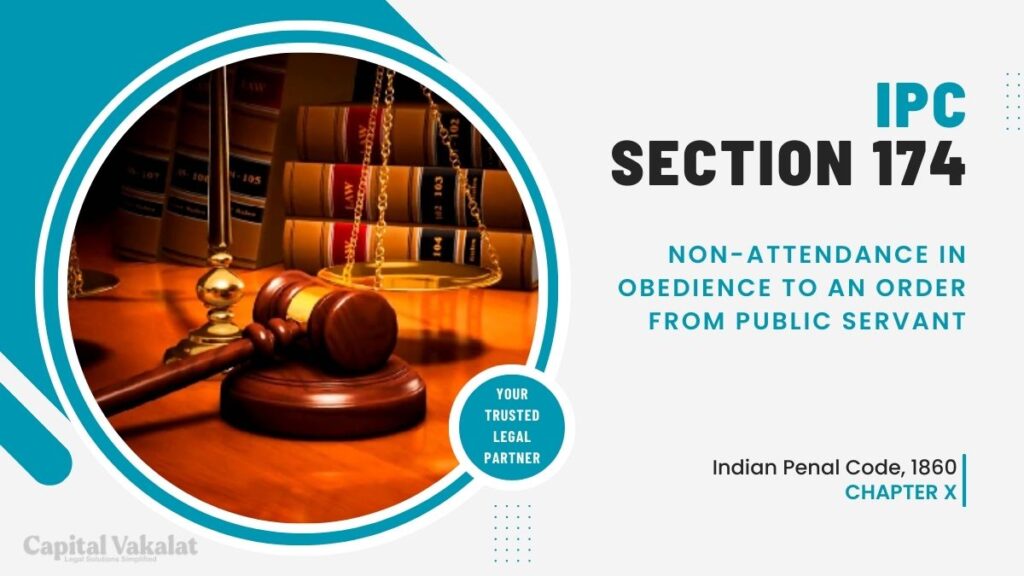When it comes to maintaining law and order, the Indian Penal Code (IPC) provides several sections that define and regulate different aspects of public conduct. Section 174 IPC addresses the issue of non-attendance in obedience to an order from a public servant, an essential provision for ensuring public cooperation and discipline.

In this article, we will delve into the specifics of Section 174 IPC, its importance, consequences, and more.
The Importance of Obedience to Public Servants
Public servants play a pivotal role in the functioning of a democracy. They issue orders and directions to maintain peace, enforce the law, and ensure public welfare. Obedience to these orders is critical to uphold the rule of law and societal harmony.
Non-attendance as a Crime
Section 174 IPC deals with individuals who willfully neglect or refuse to attend in obedience to a summons, notice, or order issued by a public servant. This act is considered a crime and is punishable under the law.
Exceptions to Section 174 IPC
While the section is clear about the obligation to obey public servants’ orders, there are exceptions. The law acknowledges that certain circumstances may prevent compliance, such as sickness, disability, or natural disasters.
The Legal Consequences
Non-compliance with Section 174 IPC can lead to legal consequences. Those found guilty may face fines or imprisonment, depending on the severity of the offense and the impact on public order.
Recent Case Studies
To understand the practical implications of Section 174 IPC, let’s look at some recent case studies where individuals were prosecuted for non-attendance in obedience to public servants’ orders. These examples shed light on the significance of this legal provision.
The Role of Police in Implementing Section 174 IPC
The police are primarily responsible for implementing Section 174 IPC. They investigate cases of non-attendance and gather evidence for prosecution. Their role is crucial in upholding the rule of law.
Challenges in Enforcing Section 174 IPC
Despite its importance, there are challenges in enforcing Section 174 IPC. Lack of awareness, limited resources, and delays in legal proceedings are some of the hurdles faced in its implementation.
Criticisms and Reforms
Like any legal provision, Section 174 IPC has faced criticism. Some argue that it is too stringent, while others call for reforms to make it more effective and just.
The Need for Awareness
To ensure the public’s compliance with Section 174 IPC, awareness campaigns and educational initiatives are essential. This can help people understand their responsibilities and rights in relation to public servants’ orders.
How to Stay Compliant
Staying compliant with Section 174 IPC is not complex. It requires attentiveness to official orders and an understanding of the exceptions. Simple steps can help individuals avoid legal trouble.
Conclusion
In conclusion, Section 174 IPC is a crucial legal provision that ensures obedience to public servants’ orders. It plays a vital role in maintaining law and order in society, and its enforcement is necessary for a well-functioning democracy.
In conclusion, Section 174 IPC is a critical component of Indian law that emphasizes the importance of obedience to orders from public servants. Its enforcement helps maintain public order and democracy. Understanding this section and complying with its provisions is essential for all citizens. If you have any more questions or concerns, feel free to explore our FAQs section for further information.
Frequently Asked Questions
Are there any exceptions to this section?
Yes, there are exceptions that acknowledge circumstances like illness, disability, or natural disasters that may prevent compliance with public servants’ orders.
How can one report non-attendance to the police?
You can report instances of non-attendance to your local police station or through official channels. Providing evidence and details is crucial for a thorough investigation.
Can I challenge an order from a public servant if I believe it’s unjust?
Yes, you can challenge an order through legal means if you believe it to be unjust. Seek legal advice and follow the appropriate legal procedures.
What is the role of public awareness campaigns in upholding Section 174 IPC?
Public awareness campaigns play a vital role in educating people about their responsibilities and rights regarding public servants’ orders. They help ensure compliance and maintain social harmony.